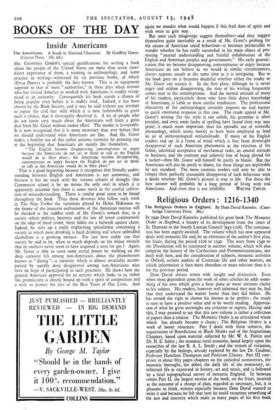BOOKS OF THE DAY
Inside Americans
The Americans. A Study in National Character. By Geoffrey Goren (Cresset Press. 10s. 6d.) MR. GEOFFREY GORER'S special qualifications for writing a book about the people of the United States are more than seven years' direct experience of them, a training in anthropology, and Some practice in writing—witnessed by six previous books, of which Africa Dances is probably the best known. This is an equipment superior to that of most "authorities," in these days when anyone who has visited America or worked with Americans is readily recog- nised as an authority. Consequently his book stands a chance of being popular even before it is widely read. Indeed, it has been chosen by the Book Society, and it may be said without any attempt to repeat the civil leer with which it is now fashionable to greet such a choice, that it thoroughly deserved it. A lot of people who do not know very much about the Americans will learn a great deal from Mr. Gorer without undue effort. The market is favourable. It is now recognised that it is more necessary than ever before that we should understand what Americans are like. And Mr. Gorer makes a healthy use of this rather anxious curiosity by pointing out at the beginning that Americans are mainly like themselves.
"The English become disapproving, contemptuous or angry because the Americans do not act or think or talk as the English would do in their place; the Americans become disapproving, contemptuous or angry because the English do not act or think or talk as the. Americans would do in their place."
That is a good beginning because it recognises that friendly under- standing between English and Americans is not automatic, and because it has no truck with. the various schools of thought (the Communist school is by no means the only one) in which it is apparently assumed that there is some merit in the careful cultiva- tion of misunderstanding. There is similar good sense to be found throughout the book. Thus those devotees who follow each week in The New Yorker the variations played by Helen Hokinson on the theme of the innocent enthusiasms of the American matron will be shocked at the sudden truth of Mr. Gorer's remark that, in a society where politics, business and the law all teeter continuously on the edge of sheer crime, these ladies are a bulwark against chaos. Indeed, he stirs up a really frightening speculation concerning a society in which most drinking is hard drinking and where unbridled alcoholism is a growing menace. For just how stable can that society be said to be, when so much depends on the minor miracle that its mothers never seem to have acquired a taste for gin ? Again, Mr. Gorer is able to score some useful points by working on the deep curiosity felt among non-Americans about the phenomenon known as "dating "—a curiosity which is almost invariably accom- panied by equally deep disapproval among non-Americans who have no hope of participating in such practices. He shows how the general American approval for an activity which looks to us rather like promiscuity is closely bound up with a spirit of competition and a wish to protect the joys of the Best Years of Our Lives. And again we wonder what would happen if this -frail dam of spirit and wish were to give way.
But once such misgivings suggest themselves—and they suggest themselves quite inevitably as a result of Mr. Gorer's probing for the causes of American social behaviour—it becomes permissible to wonder whether he has really succeeded in his main object of pro- moting "mutual understanding and fruitful collaboration of the English and American peoples and governments." His early general- isation that we become disapproving, contemptuous or angry because Americans do not behave as we would in similar circumstances, always appears unsafe at the same time as it is intriguing. But as the book goes on it becomes doubtful whether either the reader or Mr. Gorer can sustain it. in the first place, although he is never angry arid seldom disapproving, the tone of his writing frequently comes near to the contemptuous. And the mental attitude of many of his readerS, particularly those who have little direct knowledge of Americans, is liable to show similar tendencies. The professional objectivity of the anthropologist certainly imposes no real barrier to quick emotional response in this case. The crude appeal of Mr. Gorer's writing (for his style is not subtle, his grammar is often peculiar, and even some faults of spelling have found their way into print) is much more important than his sporadic use of scientific phraseology, which seems mostly to have been employed to lend an air of anthropological verisimilitude. If many of his English readers end up in a frame of mind which is free from downright disapproval of such American phenomena as the rejection of the father, uncritical acceptance of mechanical tasks, an amoral attitude to business and the constant and unlovely fear of being played for a sucker—then Mr. Gorer will himself be partly to blame. But the Americans will also be partly to blame, for these things are deplorable by any standard. The more cautious readers will only be able to temper their perfectly reasonable disapproval of such behaviour with a doubt whether Mr. Gorer's picture is true to life. For these the best answer will probably be a long period of living with real Americans. And even that is not infallible. WALTER TAPLIN.


































 Previous page
Previous page